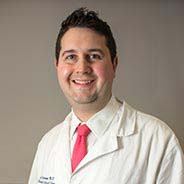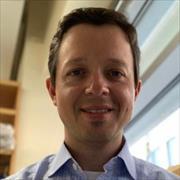Junior Faculty Foundation Awards
 Joseph Kaserman, MD
Joseph Kaserman, MD
Assistant Professor
My award is from the Alpha-1 Foundation and is a 2-year Research Grant award from the foundation. The Title of the proposal is “Mechanisms of Hepatic Heterogeneity and ATF6 Mediated Metabolic Dysfunction in AATD.” In this proposal we are investigating mechanisms that could be contributing to the increased risk of clinical liver disease seen in individuals heterozygous for the Z-mutation. As MZ individuals are estimated to represent 2% of the US population this represents a critical knowledge gap. Specifically, we will be testing whether differences in the accumulation of intracellular alpha-1 protein within subsets of hepatocytes heterozygous for the Z-mutation results in divergent branch specific activation of the unfolded protein response leading to downstream mitochondrial and metabolic dysfunction.
 Andrew Berical, MD
Andrew Berical, MD
Assistant Professor
I was awarded a 3-year ($130K per year) Harry Shwachman Clinical Investigator Award from the Cystic Fibrosis Foundation. This is a mentored, career development award given to “support promising, clinically trained physicians with a commitment to cystic fibrosis research to develop into independent biomedical researchers. The award is intended to facilitate the transition from postdoctoral training to a career in academic medicine” (straight from their website). They give out 5-10 of these awards a year.
My proposal focuses on high resolution and genetically controlled comparison of primary and induced pluripotent stem cell derived airway epithelial cells, derived from healthy and CF donors.
Learn More about this Award
 Justin Lui, MD, MS
Justin Lui, MD, MS
Instructor
Justin K. Lui, MD, MS was awarded the Jenesis Innovative Research Award, an annual award funded by United Therapeutics Corporation that provides 1-year financial support of up to $100,000 to 3 US-based junior faculty who are engaged in innovative research that will advance scientific knowledge and enhance patient care in pulmonary hypertension. In his proposed research entitled, “Biomarkers of Left Ventricular Strain,” he will be applying 2D speckle tracking echocardiography using the Scleroderma Biorepository at Boston University School of Medicine to determine whether subclinical cardiac involvement is the result of increasing cardiac fibrosis and contributes to poor prognosis in systemic sclerosis-related pulmonary hypertension.
Learn More about this Award